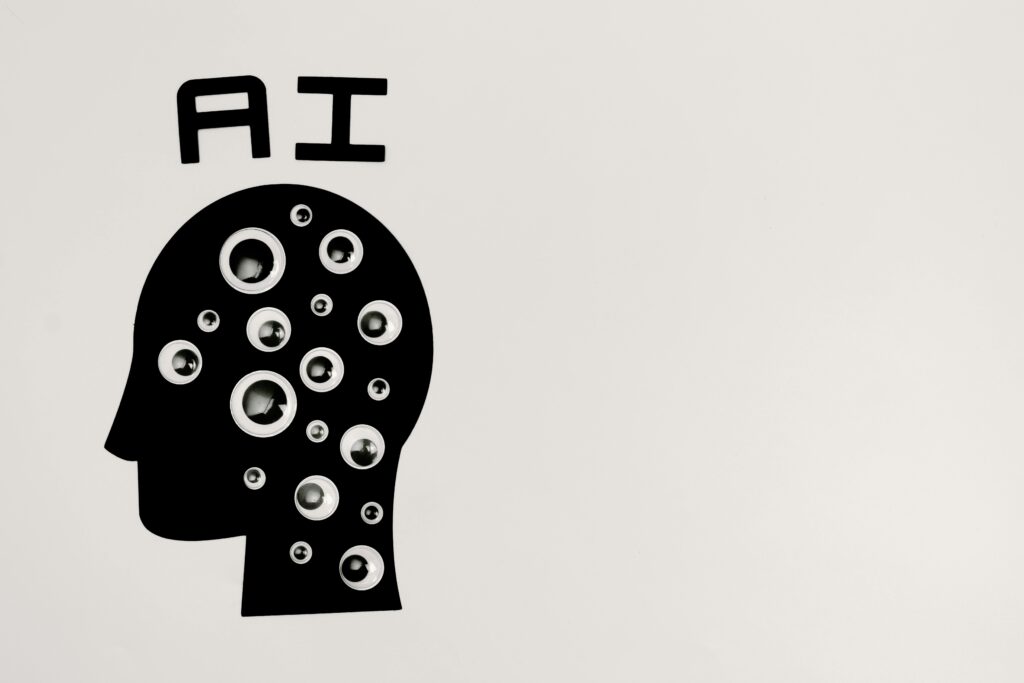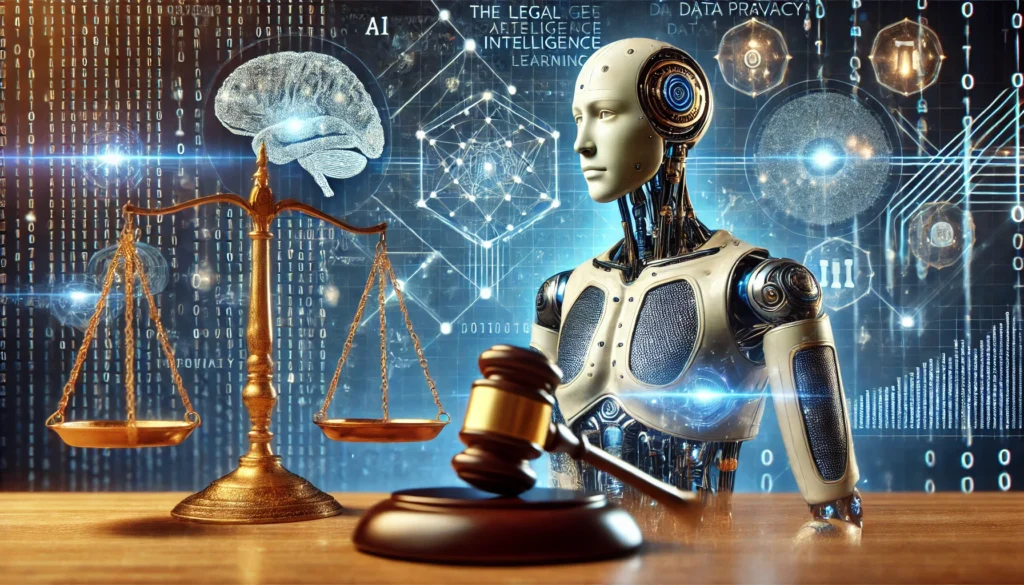Published On: 8 August, 2023
LEGAL IMPLICATIONS OF ARTIFICIAL INTELLIGENCE IN INDIA
Introduction
The subject of legal research is one that will change significantly with the introduction of AI in the legal system. AI is rapidly becoming ubiquitous across industries, revolutionizing the way we work and live. Artificial intelligence, which is akin to natural intelligence demonstrated by people or other animals, is the simulation of human intellect displayed by technology, particularly computer systems.
AI is a type of computer program that can carry out operations that ordinarily call for human intelligence. The development of AI has greatly impacted our daily lives, from reminders to suggestions for articles and news stories. AI applications include advanced web search engines, recommendation systems (used by YouTube, Amazon, and Netflix), understanding human speech (such as Siri or Alexa), and self-driving cars (such as Tesla).
Relevant Regulations
While India currently has no regulations governing the use of AI in the legal system, we have (i) the Information Technology Act, 2000, relating to data protection, cyber security, and electronic transactions, and (ii) the Anticipated Digital Personal Data Protection Bill, 2022, relating to data privacy, consent and processing of personal data, both of which will be relevant to AI systems.
An Artificial Intelligence Task Force was established by the Union Ministry of Commerce and Industry in 2017 with the goal of incorporating AI into India’s economic, political, and legal thought processes. In addition, four committees were established by the Ministry of Electronics and Information Technology to create a framework for AI policy.
Furthermore, the Government of India has established the Center of Excellence for Artificial Intelligence in the Legal Field (“CEAILF”) to address some of these concerns. Recently, NITI Aayog also released the “National Strategy for Artificial Intelligence” (“NSAI”) in the form of a discussion paper, which could potentially serve as a starting point for regulating AI in India.
AI And Cyber Security
As these technologies can quickly evaluate millions of data sets and track a range of cyber risks, from malware threats to suspicious behaviour that could lead to a phishing assault, AI and machine learning are suddenly becoming crucial for information security.
AI is the ideal cyber security solution for online businesses today. Security professionals need strong support from advanced technologies like AI to work successfully and protect their organizations from cyber-attacks.
AI Affecting Lawyers Life
Lawyers in India are satisfied with and depend on practices and solutions developed many years ago, as the country’s legal system has seen technological innovation in recent years, and Indian lawyers will keep pace with the pace of emerging technology.
It provides cost-effective solutions to lawyers by pointing out legal weaknesses in decisions, providing assistance in drafting contractual documents, due diligence, legal analysis, etc. Increasing the speed, accuracy, and efficiency of many legal operations including contract review, legal research, and document analysis. AI has the potential to completely transform the legal sector. However, AI will never completely replace lawyers.
By keeping pace with international norms, India’s legal system can help strengthen its position in the global AI market and encourage international collaboration on AI development. And, Artificial Intelligence can bring the entire legal fraternity in harmony.
Worldwide Development of AI
In 1956, the field of artificial intelligence was created in academia. AI is slowly being adopted by many countries, law firms, and judiciaries. The proposed AI Act in Europe aims to establish a unified regulatory and legal framework for artificial intelligence. The EU’s AI Act emphasizes the need for openness and accountability in the development of AI systems, which will help India avoid the negative effects of AI, and also significantly impact the legal framework needed for India.
High-level statistical machine learning algorithms have dominated this subject in the early years of the twenty-first century. The method has proven to be quite effective, aiding in the resolution of numerous difficult issues in both industry and academia.
The Act aims to guarantee that AI is designed and implemented in a manner consistent with ethics, transparency, social values, basic human rights, and accountability requirements for AI developers and users. With the creation of a European Artificial Intelligence Board to oversee compliance with the Act, a legislative framework has been put in place to break down the risk of AI into three categories, namely i) unacceptable risk systems, ii) high-risk application systems, and iii) non-high risk application systems.
Current Scenario in India
India has emerged as one of the largest markets for AI with the potential to transform various sectors. Being the most populous country, the need for AI regulation has become more important in creating and applying AI systems in India. Even though there is currently no specific law for data protection, personal information is protected under Section 43A and Section 72A of the Information Technology Act.
It gives a right to compensation for improper disclosure of personal information, similar to the GDPR. The government of India has also constituted committees under it to analyse issues related to AI. Amidst all this, the proposed AI framework in Europe is setting a precedent for India and all countries, as did the GDPR.
The right to privacy was deemed a fundamental right protected by the Indian Constitution by the Supreme Court in 2017. In the coming years, AI will be able to touch everyone’s life in some form or the other. The pace of AI adoption in India is faster than the rules made to regulate it. Industries have now started the process of skilling their manpower with AI technology.In the year 2018, NITI Aayog launched various programs on applications of AI. NITI Aayog is at the forefront of doing this, for example, it has released two AI strategy documents for India: “Responsible AI” in February 2021 and “Operating Principles for Responsible AI” in August 2021.
Advantages Of AI
a) AI technology uses machine learning to learn the behaviour of business networks, detect any deviations from security incidents, and use their potential to improve network security.
b) A person may not be able to identify all the threats faced by the company. AI can detect, identify, and prevent massive damage to a network.
c) There is a lot of activity through which a lot of data is transferred daily between the customers and the business. This information needs to be protected from malicious software and people.
d) AI research can help with vulnerability management through the detection, identification, and prevention of existing security measures, which are essential to keep a company’s network secure.
e) Hackers change their strategy every day to put business networks at risk. This makes it important to prioritize security functions in a company.
Challenges
a) AI systems can reinforce pre-existing biases in the legal system, leading to biased outcomes. Especially in India, where the legal system already unfairly treats marginalized communities.
b) lack of transparency can result in the judicial system being less trustworthy. This makes it challenging to understand how decisions are made.
c) AI systems require a lot of data to function properly. Successful adoption of AI-powered systems in India is difficult due to the lack of digital data in the judicial system.
d) The use of AI in civil disputes raises ethical issues related to privacy, autonomy, and accountability.
The Way Forward
India is planning to launch its own AI program by April 2023 with a large dataset. However, it is important to prioritize the creation of a regulatory framework that addresses accountability and transparency concerns around the use of AI. it will ensure that artificial intelligence is employed in a fair, just and credible manner in legal decision-making while maintaining the integrity of the Indian legal system.
Conclusion
It is undeniable that integrating AI into the Indian judicial system has the potential to increase effectiveness and precision. However, questions of accountability and transparency must be addressed to ensure that the AI is ethical and fair. The gap created by the missing framework or regulation for AI is one of the biggest problems around the world.
AI progress is expected to accelerate further due to the rapid expansion of many forms of technology, raising concerns about the ethical and legal implications of AI. This is needed to ensure its safe and responsible use. Risks of bias and discrimination, loss of privacy and even human safety require proper regulations.
Positive achievements include the creation of organizations and committees like the CEAILF and the release of the NSAI discussion paper by NITI Aayog.
References
- Assessing the Intelligence of the Artificial Intelligence in Law: Prospects in India
- IMPACT OF ARTIFICIAL INTELLIGENCE ON INDIAN LEGAL-Prime Legal
- Artificial Intelligence Regulation: India’s Need for Legal Framework
- Ethical concerns mount as AI takes bigger decision-making role – Harvard Gazette
- THE ETHICAL IMPLICATIONS OF AI IN THE INDIAN LEGAL SYSTEM: ACCOUNTABILITY AND TRANSPARENCY – Legal Developments
- Artificial Intelligence And Laws In India
- https://indiaai.gov.in/ai
- https://pib.gov.in/newsite/PrintRelease.aspx?relid=170231
- https://www.meity.gov.in/writereaddata/files/constitution_of_four_committees_on_artificial_intelligence.pdf.
- https://niti.gov.in/sites/default/files/2019-01/NationalStrategy-for-AI-Discussion-Paper.pdf




